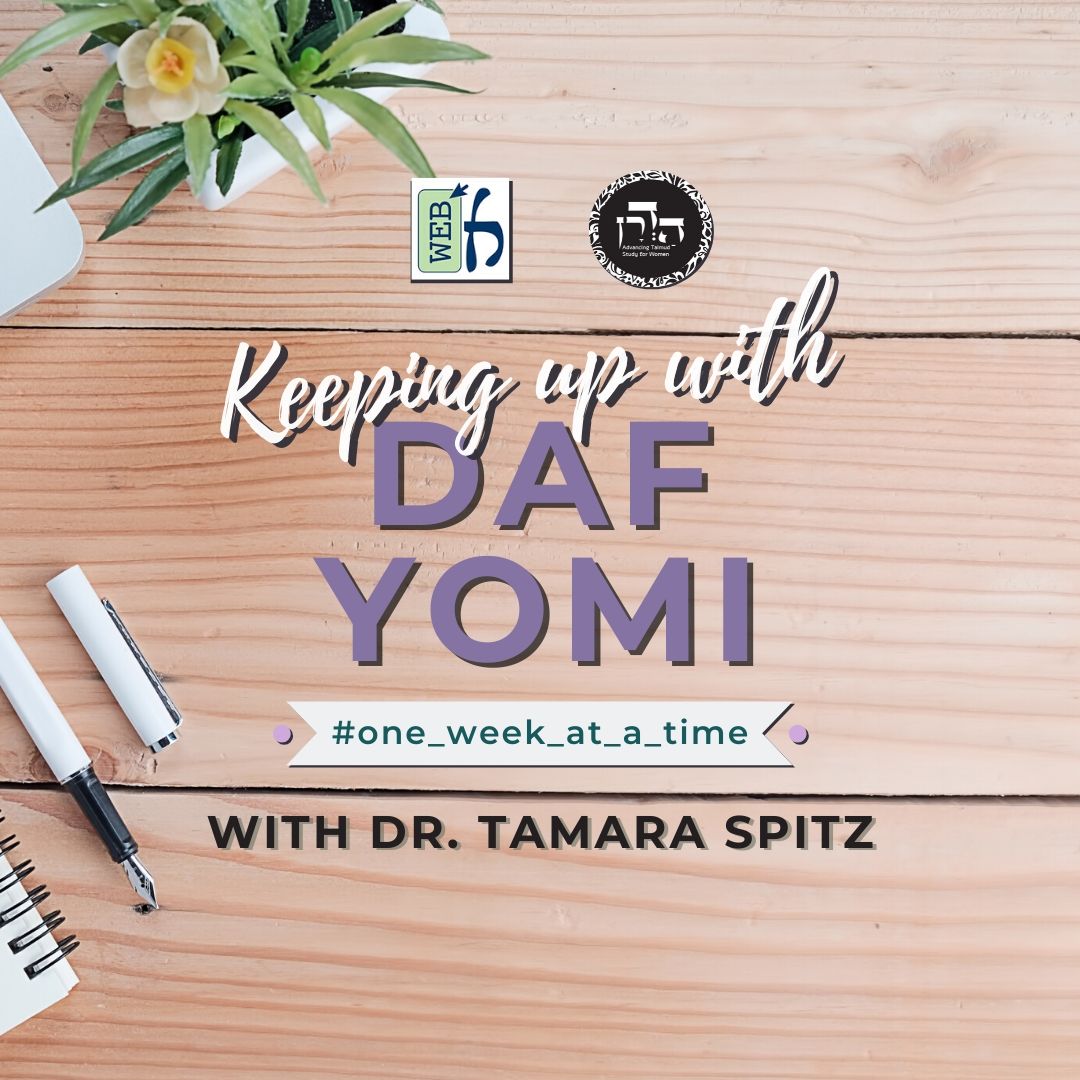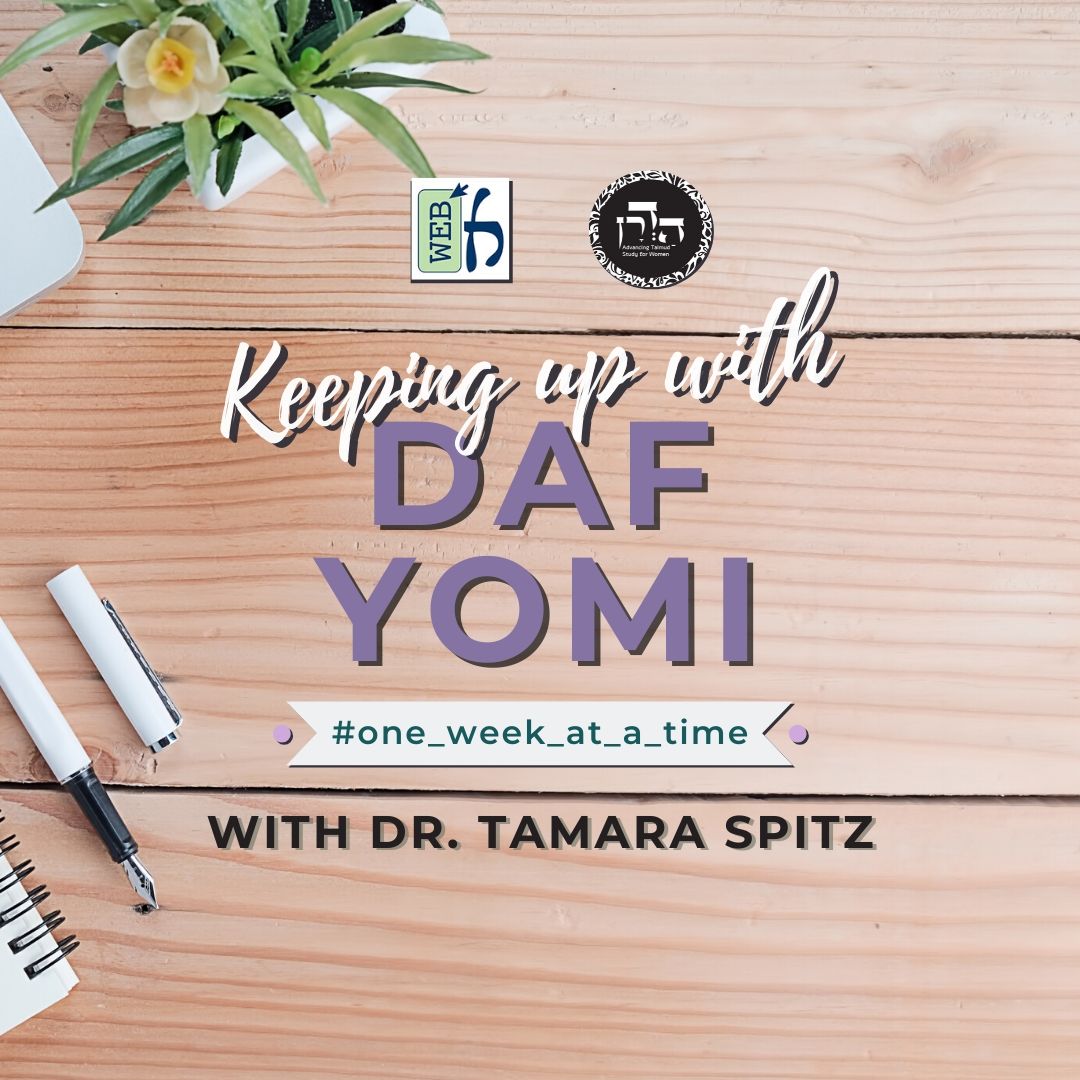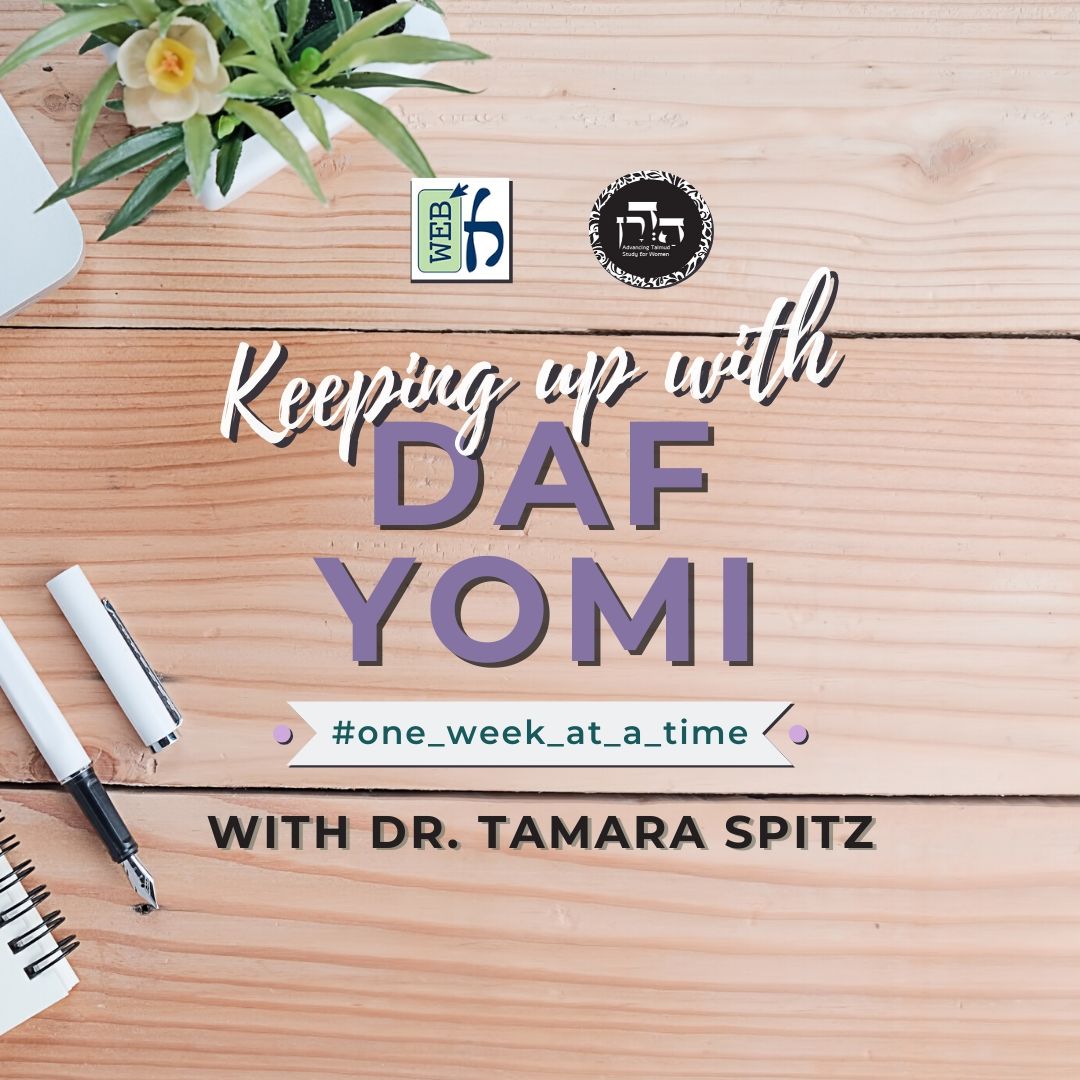The gemara brings a braita with four opinions about the case of an animal purchased from a non-Jew where the owner doesn’t know if the animal already gave birth. The gemara raises several possibilities of how to explain the differences of opinions and on what exactly they are disagreeing. Another braita is brought discussing a case of a kid that gives birth in one year to ten or more offspring. Two opinions are stated and the gemara suggests possibilities explaining their disagreement.
This week’s learning is sponsored for the merit and safety of Haymanut (Emuna) Kasau, who was 9 years old when she disappeared from her home in Tzfat two years ago, on the 16th of Adar, 5784 (February 25, 2024), and whose whereabouts remain unknown.
This week’s learning is dedicated of the safety of our nation, the soldiers and citizens of Israel, and for the liberation of the Iranian people. May we soon see the realization of “ליהודים היתה אורה ושמחה וששון ויקר”.
This week’s learning is sponsored for the merit and safety of Haymanut (Emuna) Kasau, who was 9 years old when she disappeared from her home in Tzfat two years ago, on the 16th of Adar, 5784 (February 25, 2024), and whose whereabouts remain unknown.
Want to dedicate learning? Get started here:


Today’s daily daf tools:
This week’s learning is sponsored for the merit and safety of Haymanut (Emuna) Kasau, who was 9 years old when she disappeared from her home in Tzfat two years ago, on the 16th of Adar, 5784 (February 25, 2024), and whose whereabouts remain unknown.
This week’s learning is dedicated of the safety of our nation, the soldiers and citizens of Israel, and for the liberation of the Iranian people. May we soon see the realization of “ליהודים היתה אורה ושמחה וששון ויקר”.
This week’s learning is sponsored for the merit and safety of Haymanut (Emuna) Kasau, who was 9 years old when she disappeared from her home in Tzfat two years ago, on the 16th of Adar, 5784 (February 25, 2024), and whose whereabouts remain unknown.
Today’s daily daf tools:
Delve Deeper
Broaden your understanding of the topics on this daf with classes and podcasts from top women Talmud scholars.
New to Talmud?
Check out our resources designed to help you navigate a page of Talmud – and study at the pace, level and style that fits you.
The Hadran Women’s Tapestry
Meet the diverse women learning Gemara at Hadran and hear their stories.
Bekhorot 20
מְחַוַּורְתָּא רַבִּי יִשְׁמָעֵאל כְּרַבִּי מֵאִיר סְבִירָא לֵיהּ, דְּחָיֵישׁ לְמִיעוּטָא.
It is clear, as was suggested initially, that Rabbi Yishmael holds in accordance with the opinion of Rabbi Meir, who says that one must be concerned for the minority.
רָבִינָא אָמַר: אֲפִילּוּ תֵּימָא רַבָּנַן, כִּי אָזְלִי רַבָּנַן בָּתַר רוּבָּא — בְּרוּבָּא דְּלָא תְּלֵי בְּמַעֲשֶׂה, אֲבָל רוּבָּא דִּתְלֵי בְּמַעֲשֶׂה — לָא.
Ravina says: You may even say that Rabbi Yishmael holds in accordance with the opinion of the Rabbis. When the Rabbis follow the majority, it is with regard to a majority that is not dependent upon an action but is simply the nature of reality. But in the case of a majority that is dependent upon an action, such as the pregnancy of a young goat, which depends upon whether or not it had copulated with a male, the Rabbis do not follow the majority.
תָּנוּ רַבָּנַן: עֵז בַּת שְׁנָתָהּ — וַדַּאי לַכֹּהֵן, מִיכָּן וּלְהַלָּן — סָפֵק. רָחֵל בַּת שְׁתַּיִם — וַדַּאי לַכֹּהֵן, מִיכָּן וּלְהַלָּן — סָפֵק. פָּרָה בַּת שָׁלֹשׁ — וַדַּאי לַכֹּהֵן, מִיכָּן וּלְהַלָּן — סָפֵק. חֲמוֹרָה — כְּפָרָה. רַבִּי יוֹסֵי בְּרַבִּי יְהוּדָה אוֹמֵר: חֲמוֹרָה בַּת אַרְבַּע שָׁנִים. עַד כָּאן דִּבְרֵי רַבִּי יִשְׁמָעֵאל.
§ The Sages taught in a baraita: If one purchased a goat within its first year from a gentile and does not know whether or not it had previously given birth, the subsequent male offspring certainly is given to the priest; from that point forward an offspring’s status as a firstborn is uncertain. If it was a ewe within its second year the offspring certainly is given to the priest; from that point forward an offspring’s status as a firstborn is uncertain. If it was a cow within its third year the offspring certainly is given to the priest; from that point forward an offspring’s status as a firstborn is uncertain. If it was a donkey it is subject to the same halakha as a cow. Rabbi Yosei, son of Rabbi Yehuda, says: The offspring of a donkey within its fourth year also has the status of a firstborn. Until here is the statement of Rabbi Yishmael.
כְּשֶׁנֶּאְמְרוּ דְּבָרִים לִפְנֵי רַבִּי יְהוֹשֻׁעַ, אָמַר לָהֶן: צְאוּ אִמְרוּ לוֹ לְרַבִּי יִשְׁמָעֵאל: טָעִיתָ! אִילּוּ בְּוָולָד בִּלְבַד הַבְּהֵמָה נִפְטֶרֶת — הָיָה כִּדְבָרֶיךָ, אֶלָּא סִימַן הַוָּולָד בִּבְהֵמָה דַּקָּה — טִינּוּף, וּבַגַּסָּה — שִׁלְיָא, וּבָאִשָּׁה — שָׁפִיר וְשִׁלְיָא.
The baraita continues: When these matters were stated by the students before Rabbi Yehoshua, he said to them: Go out and say to Rabbi Yishmael: You erred. Were an animal exempted only by giving birth to an offspring and in no other manner the halakha would be in accordance with your statement. But the Rabbis said: An indication of the offspring in a small animal is a murky discharge from the womb, which exempts subsequent births from the mitzva of the firstborn. And the indication in a large animal is the emergence of an afterbirth, and the indication in a woman is a fetal sac or an afterbirth.
וַאֲנִי אֵין אֲנִי אוֹמֵר כֵּן, אֶלָּא: עֵז שֶׁטִּינְּפָה בַּת שִׁשָּׁה — יוֹלֶדֶת בְּתוֹךְ שְׁנָתָהּ, רָחֵל שֶׁטִּינְּפָה בַּת שְׁנָתָהּ — יוֹלֶדֶת בְּתוֹךְ שְׁתַּיִם. אָמַר רַבִּי עֲקִיבָא: אֲנִי לֹא בָּאתִי לִידֵי מִדָּה זוֹ, אֶלָּא: כֹּל שֶׁיָּדוּעַ שֶׁבִּיכְּרָה — אֵין כָּאן לַכֹּהֵן כְּלוּם, וְכֹל שֶׁלֹּא בִּיכְּרָה — הֲרֵי זוֹ לַכֹּהֵן, סָפֵק — יֵאָכֵל בְּמוּמוֹ לַבְּעָלִים.
Rabbi Yehoshua added: That is the opinion of the Rabbis, but I myself do not say so. Rather, I hold that a goat that expelled a murky discharge from the womb at the age of six months can give birth within its first year, and a ewe that expelled a murky discharge in its first year can give birth within its second year. The Gemara will later discuss the practical difference between his opinion and the ruling that he ascribes to the Rabbis. Rabbi Akiva says: I have not arrived at this method of determining firstborn status. Rather, in any case where it is known that the animal had previously given birth, the priest has nothing here. And in any case where it is known that the animal had not previously given birth, that is given to the priest. And if it is uncertain, it may be eaten in its blemished state by the owner.
בְּמַאי קָמִיפַּלְגִי רַבִּי יִשְׁמָעֵאל וְרַבִּי יְהוֹשֻׁעַ? לֵימָא בְּטִינּוּף פּוֹטֵר קָמִיפַּלְגִי, רַבִּי יִשְׁמָעֵאל סָבַר טִינּוּף אֵינוֹ פּוֹטֵר, וְרַבִּי יְהוֹשֻׁעַ סָבַר טִינּוּף פּוֹטֵר?
The Gemara analyzes the baraita. With regard to what matter do Rabbi Yishmael and Rabbi Yehoshua disagree? Shall we say they disagree with regard to whether or not a murky discharge from the womb exempts an animal from the mitzva of the firstborn; as Rabbi Yishmael holds that a murky discharge does not exempt an animal because it is not a sign of a birth, and Rabbi Yehoshua holds that a murky discharge exempts an animal?
אִי דַּחֲזֵינָא דְּטַינִּוף — דְּכוּלֵּי עָלְמָא לָא פְּלִיגִי דְּטִינּוּף פּוֹטֵר, וְהָכָא בְּחוֹשְׁשִׁין לְטִינּוּף קָא מִיפַּלְגִי: רַבִּי יִשְׁמָעֵאל סָבַר: אֵין חוֹשְׁשִׁין לְטִינּוּף, וְרַבִּי יְהוֹשֻׁעַ סָבַר: חוֹשְׁשִׁין לְטִינּוּף.
The Gemara rejects this suggestion: If we actually see a murky discharge, everyone agrees that the murky discharge exempts an animal. And here, it is with regard to whether one is concerned about the possibility that an animal might have expelled a murky discharge that they disagree. Rabbi Yishmael holds that we are not concerned about a murky discharge, and it can therefore be assumed that the first offspring born after its purchase from the gentile is firstborn; and Rabbi Yehoshua holds that one is concerned about a murky discharge, and due to the uncertainty the next offspring remains with its owner.
וְלָא חָיֵישׁ? וְהָאָמַר רָבָא: מְחַוַּורְתָּא רַבִּי יִשְׁמָעֵאל כְּרַבִּי מֵאִיר סְבִירָא לֵיהּ, דְּחָיֵישׁ לְמִיעוּט! כִּי חָיֵישׁ — לְחוּמְרָא, לְקוּלָּא — לָא חָיֵישׁ.
The Gemara objects: And is it correct that Rabbi Yishmael is not concerned about the possibility that the mother might have expelled a murky discharge before giving birth to a live offspring? But doesn’t Rava say: It is clear that Rabbi Yishmael holds in accordance with the opinion of Rabbi Meir, who says one must be concerned for the minority? If so, Rabbi Yishmael should be concerned for a murky discharge as well. The Gemara explains: Where Rabbi Yishmael is concerned is when the concern leads to a stringency. But if the concern would lead to a leniency, as in this case, where it would mean that the animal born after a year is only an uncertain firstborn, he is not concerned.
וְאִיבָּעֵית אֵימָא: בֵּין לְקוּלָּא בֵּין לְחוּמְרָא חָיֵישׁ, וְהָכָא בִּמְטַנֶּפֶת וְחוֹזֶרֶת וְיוֹלֶדֶת בְּתוֹךְ שְׁנָתָהּ קָמִיפַּלְגִי, דְּרַבִּי יִשְׁמָעֵאל סָבַר: מְטַנֶּפֶת אֵינָהּ חוֹזֶרֶת וְיוֹלֶדֶת בְּתוֹךְ שְׁנָתָהּ, וְהָא מִדְּאוֹלִיד — וַדַּאי לָא טַנִּיף. וְרַבִּי יְהוֹשֻׁעַ סָבַר: מְטַנֶּפֶת חוֹזֶרֶת וְיוֹלֶדֶת בְּתוֹךְ שְׁנָתָהּ.
And if you wish, say instead: Whether it leads to a leniency or whether it leads to a stringency Rabbi Yishmael is concerned, and here they disagree with regard to whether or not an animal can expel a murky discharge and then return to its fertile state and give birth within its first year. As Rabbi Yishmael holds: An animal that expels a murky discharge does not return to its fertile state and give birth within its first year, and accordingly, from the fact that this animal gave birth it can be concluded that it certainly did not expel a murky discharge beforehand. And Rabbi Yehoshua holds: An animal that expels a murky discharge returns to its fertile state and can give birth within its first year.
וַאֲנִי אֵינִי אוֹמֵר כֵּן, אֶלָּא עֵז שֶׁטִּינְּפָה בַּת שִׁשָּׁה — יוֹלֶדֶת תּוֹךְ שְׁנָתָהּ, רָחֵל שֶׁטִּינְּפָה בַּת שְׁנָתָהּ — יוֹלֶדֶת בְּתוֹךְ שְׁתַּיִם. מַאי אִיכָּא בֵּין גְּמָרֵיהּ לִסְבָרֵיהּ?
§ The baraita teaches that Rabbi Yehoshua said: That is the opinion of the Rabbis, but I myself do not say so. Rather, I hold that a goat that expelled a murky discharge from the womb at the age of six months still gives birth within its first year, while a ewe that expelled a murky discharge in its first year still gives birth within its second year. The Gemara asks: Since according to both opinions an animal that expelled a murky discharge can still give birth within a year, what difference is there between Rabbi Yehoshua’s tradition of the opinion of the Rabbis and his own reasoning?
שֶׁטִּינְּפָה בְּסוֹף שִׁשָּׁה, וְאִיכָּא בֵּינַיְיהוּ דִּזְעֵירִי, דְּאָמַר זְעֵירִי: אֵין טִינּוּף פָּחוֹת מִשְּׁלֹשִׁים יוֹם.
The Gemara answers: The difference between their opinions is in a case where a goat expelled a murky discharge at the end of its first six months of life, when the seventh month began, and then gave birth before the end of its first year. And there is a difference between them with regard to the statement of Ze’eiri, as Ze’eiri says: The expulsion of a murky discharge, which is sufficient to exempt an animal from having its future offspring counted a firstborn, prevents it from being impregnated for no less than thirty days. If an animal becomes pregnant within thirty days of expelling a murky discharge, evidently that discharge was not the sign of a fetus, and therefore the offspring will have firstborn status.
לִגְמָרֵיהּ — אִית לֵיהּ דִּזְעֵירִי, לִסְבָרֵיהּ — לֵית לֵיהּ דִּזְעֵירִי.
In this case, as the pregnancy of a goat lasts five months and a murky discharge was expelled at the end of the sixth month, a goat that gave birth by the end of the year, i.e., twelve months, must have become pregnant within a month of the discharge. The Rabbis, whose opinion Rabbi Yehoshua cited by tradition, accept the statement of Ze’eiri, and therefore they rule that this goat, which became pregnant within a month of the discharge, is not exempt from the mitzva of the firstborn. According to Rabbi Yehoshua’s own reasoning, he does not accept the statement of Ze’eiri, which means that although this animal became pregnant within a month of the discharge, it was nevertheless exempt from the mitzva of the firstborn.
וְאִיבָּעֵית אֵימָא: דְּכוּלֵּי עָלְמָא אִית לְהוּ דִּזְעֵירִי, וְהָכָא — בְּיוֹלֶדֶת לִמְקוּטָּעִין קָמִיפַּלְגִי;
The Gemara suggests another answer: And if you wish, say that everyone accepts the statement of Ze’eiri; and here, in the case of a goat that gave birth within its first year after having expelled a murky discharge at the end of its sixth month, they disagree with regard to whether or not an animal gives birth after incomplete months, i.e., prematurely.
לִגְמָרֵיהּ — לָא אָמְרִינַן יוֹלֶדֶת לִמְקוּטָּעִין, לִסְבָרֵיהּ — אָמְרִינַן יוֹלֶדֶת לִמְקוּטָּעִין.
According to Rabbi Yehoshua’s tradition of the opinion of the Rabbis, we do not say that an animal gives birth after incomplete months, and therefore if it gave birth within its first year it must have become pregnant within thirty days of the discharge, which means the discharge was not indicative of a fetus and does not exempt the next offspring from being counted a firstborn. According to Rabbi Yehoshua’s own reasoning, we say an animal gives birth after incomplete months, and consequently it is possible the animal became pregnant later than thirty days after the discharge and its term of pregnancy was shorter than normal. If so, the discharge does exempt the next offspring from firstborn status.
וְאִיבָּעֵית אֵימָא: לָא אָמְרִינַן יוֹלֶדֶת, וְהָכָא בְּמִקְצָת הַיּוֹם כְּכוּלּוֹ קָמִיפַּלְגִי. לִסְבָרֵיהּ — אָמְרִינַן מִקְצָת הַיּוֹם כְּכוּלּוֹ, לִגְמָרֵיהּ — לָא אָמְרִינַן מִקְצָת הַיּוֹם כְּכוּלּוֹ.
And if you wish, say that everyone accepts Ze’eiri’s statement and we do not say that an animal gives birth prematurely, and here, they disagree with regard to whether or not the halakhic status of part of the day is like an entire day: According to Rabbi Yehoshua’s reasoning we say part of the day is like an entire day, and therefore it is possible for the goat to have become pregnant on the thirtieth day after experiencing the discharge and to give birth precisely five months later, just before the year ends. According to his tradition of the opinion of the Rabbis, we do not say part of the day is like an entire day, which means that the earliest possible birth is on the first day of the second year.
אָמַר רַבִּי עֲקִיבָא: אֲנִי לֹא בָּאתִי לִידֵי מִדָּה זוֹ, אֶלָּא כֹּל שֶׁיָּדוּעַ כּוּ׳. מַאי אִיכָּא בֵּין רַבִּי עֲקִיבָא לְרַבִּי יְהוֹשֻׁעַ?
The baraita taught that Rabbi Akiva says: I have not arrived at this method of determining firstborn status. Rather, in any case where it is known the animal had previously given birth, the priest has nothing here. And in any case where it is known the animal had not previously given birth, its firstborn is given to the priest. And if it is uncertain, it may be eaten in its blemished state by the owner. The Gemara asks: What difference is there in practice between the opinions of Rabbi Akiva and Rabbi Yehoshua?
אָמַר רַבִּי חֲנִינָא מִסּוּרָא: חָלָב פּוֹטֵר אִיכָּא בֵּינַיְיהוּ, רַבִּי עֲקִיבָא סָבַר: חָלָב פּוֹטֵר, הַלֵּךְ אַחַר רוֹב בְּהֵמוֹת, וְרוֹב בְּהֵמוֹת אֵין חוֹלְבוֹת אֶלָּא אִם כֵּן יוֹלְדוֹת, וְרַבִּי יְהוֹשֻׁעַ סָבַר: הָא אִיכָּא מִיעוּטָא דְּחוֹלְבוֹת אַף עַל פִּי שֶׁאֵין יוֹלְדוֹת.
Rabbi Ḥanina of Sura says: There is a difference between them in a case where the animal came into the Jew’s possession after it had already started to produce milk. They differ as to whether or not the production of milk is sufficient to exempt an animal from having its next offspring counted a firstborn. Rabbi Akiva holds: Milk exempts it, as we follow the majority of animals, and the majority of animals do not produce milk unless they have given birth. And Rabbi Yehoshua holds: Since there is a minority of animals that do produce milk even though they have not given birth, the animal that is born later is an uncertain firstborn.
וּמִי חָיֵישׁ רַבִּי יְהוֹשֻׁעַ לְמִיעוּט? וְהָתְנַן: הָיְתָה לָהּ חֲמוֹת — אֵינָהּ חוֹשֶׁשֶׁת, יָצְאָה מְלֵיאָה — חוֹשֶׁשֶׁת. רַבִּי יְהוֹשֻׁעַ אוֹמֵר: אֵינָהּ חוֹשֶׁשֶׁת.
The Gemara asks: And is Rabbi Yehoshua concerned for a minority? Didn’t we learn in a mishna (Yevamot 119a): If a woman’s husband passed away before she had given birth to any children and the husband had no known brothers who could perform levirate marriage, even though she has a mother-in-law who traveled overseas and may have conceivably given birth to a male who could later perform levirate marriage, she does not need to be concerned for that possibility and may marry another man without finding out if a male child had been born. But if the mother-in-law left while she was full, i.e., pregnant, the daughter-in-law must be concerned that a male might have been born. Rabbi Yehoshua says: She does not need to be concerned.
וְאָמְרִינַן: מַאי טַעְמָא דְּרַבִּי יְהוֹשֻׁעַ? קָסָבַר: רוֹב מְעוּבָּרוֹת יוֹלְדוֹת, וּמִיעוּט מַפִּילוֹת, וְכׇל הַיּוֹלְדוֹת — מֶחֱצָה זְכָרִים וּמֶחֱצָה נְקֵבוֹת. סְמוֹךְ מִיעוּטָא דְּמַפִּילוֹת לְמֶחֱצָה דִּנְקֵבוֹת, וְהָווּ לְהוּ זְכָרִים מִיעוּטָא, וּלְמִיעוּטָא לָא חָיְישִׁינַן!
And we say: What is the reasoning of Rabbi Yehoshua? He holds the majority of pregnant women give birth to a child and a minority miscarry. And of all those who give birth, half bear males and half bear females. Combine the minority of those who miscarry with the half that give birth to females, and conclude that the males are in fact a minority, and we are not concerned for a minority. Evidently, Rabbi Yehoshua holds there is no need to be concerned for a minority.
אֶלָּא אֵיפוֹךְ, וְהָתַנְיָא: חָלָב פּוֹטֵר, דִּבְרֵי רַבִּי יְהוֹשֻׁעַ. רַבִּי עֲקִיבָא אוֹמֵר: חָלָב אֵינוֹ פּוֹטֵר.
Rather, reverse the two opinions in the mishna. And in fact it is taught in that manner in a baraita: The production of milk exempts an animal from having its offspring counted a firstborn; this is the statement of Rabbi Yehoshua. Rabbi Akiva says: The production of milk does not exempt an animal from having its offspring counted a firstborn.
תָּנוּ רַבָּנַן: גְּדִיָּיה שֶׁיָּלְדָה שָׁלֹשׁ בָּנוֹת, וְכׇל בְּנוֹתֶיהָ יָלְדוּ שָׁלֹשׁ שָׁלֹשׁ — כּוּלָּן נִכְנָסוֹת לַדִּיר לְהִתְעַשֵּׂר. אָמַר רַבִּי שִׁמְעוֹן: אֲנִי רָאִיתִי שֶׁעִישְּׂרָה בְּתוֹךְ שְׁנָתָהּ. לְמָה לִי לְמִיתְנֵי שָׁלֹשׁ שָׁלֹשׁ? תּוֹלֵיד חַד מִינַּיְיהוּ תְּלָת, וְאִינָךְ תַּרְתֵּי תַּרְתֵּי!
§ The Sages taught in a baraita: In the case of a kid that gave birth to female triplets and all her offspring each gave birth to female triplets, all of them, i.e., the offspring and their offspring, enter the pen to be tithed. The animal tithe applies only if one owns at least ten or more animals born in the same year that are not male firstborns. Rabbi Shimon says: I saw a single kid that yielded enough offspring to be subject to the tithe within its first year of life. The Gemara asks: Why do I need the baraita to teach that each offspring gave birth to three other offspring? Let one of them give birth to three, and let the other two give birth to two each, so that there are a total of ten goats born within a single year, which are therefore subject to the tithe.
אַיְּידֵי דְּאִיכָּא חֲדָא דְּלָא סַגִּיא בְּלָא שָׁלֹשׁ, תְּנָא כּוּלְּהוּ דְּיָלְדוּ שָׁלֹשׁ שָׁלֹשׁ. וּלְמָה לִי לְמִיתְנֵי שָׁלֹשׁ כְּלָל? לֵילְדוּ כּוּלְּהוּ תַּרְתֵּי, וְתִיהְדַּר אִיהִי וְתוֹלֵיד בַּהֲדַיְהִי!
The Gemara answers: Since there is one goat in this case that would not produce a sufficient number of offspring without giving birth to three, the baraita taught a case where all three goats gave birth to three offspring each, for the sake of consistency. The Gemara asks: But why do I need to teach that any goat gave birth to three at once at all? Let all the second-generation goats give birth to two offspring, and let her, the mother of the three second-generation goats, give birth again to another goat together with them. The fact that the baraita did not teach this case indicates that a goat cannot give birth again within the same year.








































